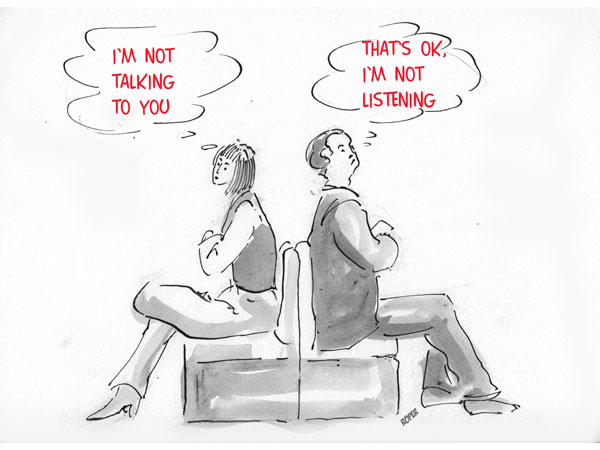
Have you ever been ‘ghosted’? That potential customer who seemed so interested in doing business with you, then never came back? The job interviewer who seemed so keen, then went silent and stopped returning your emails and calls? The enthusiastic young applicant for the vacant role in your office who never turned up on the day?
It’s easy, isn’t it, to get exasperated when people let us down. But it’s harder to admit that sometimes we’re also guilty of ghosting. Maybe you promise to make a business introduction, pass on a CV, or provide some information to a contact, and for whatever reason you don’t end up following through. If we’re honest, we’ve probably all done it.
Ghosting is common in both personal and professional relationships. In a 2018 study published in the Journal of Social and Personal Relationships, 25% of participants reported having been ghosted by a partner. When it comes to job seeking, 93% of respondents in a 2020 LinkedIn poll said they had been ghosted during an active hiring process.
Why does it happen?
We’re tempted to put off returning calls, replying to emails or keeping a promise to help someone for a number of reasons. We’re too busy and other priorities intervene, we get overwhelmed and simply forget, we’re no longer interested, or maybe we’re just anxious about having a tricky conversation.
Ghosting has consequences – missing out on opportunities, talent or revenue for yourself or your business – or even worse, eroding your personal reputation or your business brand.
What’s the answer?
Here are some ways to honour the commitments you make to others, while at the same time conserving your energy and protecting your own work/life balance.
- Learn to say no more often
It sounds easy, but this is possibly the hardest advice to follow. The best time to say no is obviously at the point of request, assuming you’ve had time to check your calendar and give it some thought right there and then. More often, however, you may find you are taken by surprise, don’t want to be ungrateful or appear to hesitate, so you say ‘yes’ on the spot.
Later, the misgivings start when you look at your calendar and consider your other commitments. This is when the temptation to ghost the other person may creep in. And it’s precisely when you need to call or write to them saying something like, “Thank you so much for asking me to do xyz the other day. Unfortunately, on reflection and on checking my other commitments, I’m afraid I don’t have the time right now. My apologies, and I hope you find someone else to help” (and offer an alternative if you are able to).
Don’t be tempted to make up a story which can easily be disproved and catch you out – just tell the simple truth, and resolve to say ‘no’ sooner in future. Or you can…
- …Buy time for yourself
It takes time to learn to say no on the spot. You may actually want a bit of time to consider the offer, opportunity or request and check whether it fits with other priorities. Just remember, you don’t have to say ‘yes’ either. It’s perfectly acceptable to say, “thank you for the offer. I’d like to give it some thought – can I come back to you?” Remember to allow yourself a reasonable amount of time, too – you don’t have to offer to get back to them today!
If a potential client or customer asks for a proposal or a quote, unless they specifically state a short timescale, the temptation is always to put yourself under pressure to get something back to them. Remember, it’s always acceptable, and arguably more professional, to consider your own commitments before promising to provide the materials. We’ve often been surprised when we say, “will the end of the week be ok?” and the client responds that they will be away for a few days and the middle of next week will be fine. We forget sometimes that they have a workload too!
- Pay the opportunity forward
If you know you will sometimes need to say no, it pays to have a number of other providers of various sorts in mind, so you can nominate others to help. Even if the requester doesn’t take you up on the offer, they will be impressed by your willingness to help and by the breadth of your network. Create a list of trusted peers whose permission you have sought in advance – don’t give away their time without their permission – and make sure that the opportunities you recommend them for are a good fit for them too.
Tell the truth
The recent shake-up in all our working lives has caused many people to consider carefully what they want from work and from life generally. There’s never been a better time to practise the skills of saying ‘no’, buying time to consider how a work task fits with your needs, or building a wider network to allow you to share the load more widely. It’s no longer acceptable for people unquestioningly to ask too much of others. Don’t fall into the trap of playing an outdated game, by unthinkingly overloading yourself.
Don’t put off telling the truth. because the longer you wait, the more likely you are to ghost. In this current economic climate, there will be more tough news to share. Accept the power and responsibility you have as a leader and put an end to fudging, fibbing and ghosting once and for all.
Based on an original article in the Harvard Business Review by Mita Mallick.
If you’d like to discuss any of the issues raised, call us on 01865 881056 or email km@leaderslab.co.uk.


About The Author: Kate Mercer
Kate creates working environments that allow you, your people and your organisation to produce great results through communication, real teamwork and streamlined working practices.
More posts by Kate Mercer